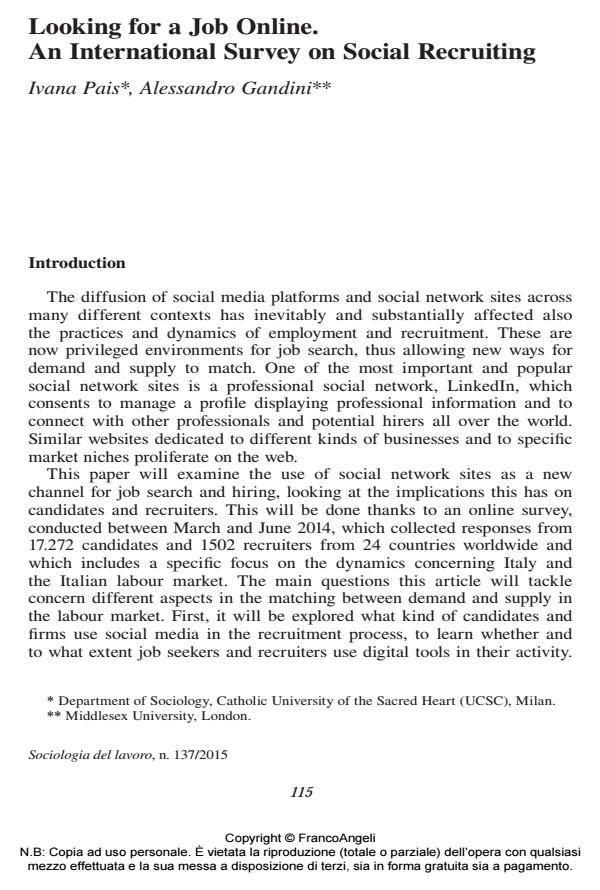Looking for a Job Online. An International Survey on Social Recruiting
Titolo Rivista SOCIOLOGIA DEL LAVORO
Autori/Curatori Ivana Pais, Alessandro Gandini
Anno di pubblicazione 2015 Fascicolo 2015/137 Lingua Inglese
Numero pagine 15 P. 115-129 Dimensione file 98 KB
DOI 10.3280/SL2015-137007
Il DOI è il codice a barre della proprietà intellettuale: per saperne di più
clicca qui
Qui sotto puoi vedere in anteprima la prima pagina di questo articolo.
Se questo articolo ti interessa, lo puoi acquistare (e scaricare in formato pdf) seguendo le facili indicazioni per acquistare il download credit. Acquista Download Credits per scaricare questo Articolo in formato PDF

FrancoAngeli è membro della Publishers International Linking Association, Inc (PILA)associazione indipendente e non profit per facilitare (attraverso i servizi tecnologici implementati da CrossRef.org) l’accesso degli studiosi ai contenuti digitali nelle pubblicazioni professionali e scientifiche
The paper examines the use of social network sites as a new channel for job search and hiring, looking at the implications this has on candidates and recruiters. This will be done thanks to an online survey, conducted between March and June 2014, which collected responses from more than 17.000 candidates and 1500 recruiters from 24 countries and which includes a specific focus on the dynamics concerning Italy. The main questions this article tackles are: what kind of candidates and firms use social media in the recruitment process; what is the effectiveness of social media in the matching between supply and demand in the labour market; how candidates represent themselves online and how their digital reputation impacts on job search, potentially changing the role of social capital in social recruiting.
L’articolo analizza l’utilizzo dei siti di social networking come nuovo canale di reclutamento e selezione e le relative implicazioni per candidati e selezionatori. L’analisi si basa sui risultati di un questionario online, somministrato tra marzo e giugno 2014 a un campione auto-selezionato, che ha raccolto le risposte di oltre 17.000 candidati e 1500 reclutatori da 24 paesi e che comprende un focus specifico sulle dinamiche riguardanti l’Italia. Le principali questioni affrontate in questo articolo sono: che tipo di candidati e di aziende utilizzano i social media nel processo di reclutamento; qual è l’efficacia dei social media nell’incontro tra domanda e offerta di lavoro; come i candidati si presentano online e come la reputazione e il loro capitale sociale digitale possa influenzare gli esiti della ricerca di lavoro.
Keywords:Social recruiting, lavoro digitale, reputazione, online ricerca del lavoro, capital sociale, Italia
- Blau D.M., Robins P.K. (1990). Job search outcomes for the employed and unemployed. Journal of Political Economy: 637-655.
- Boyd D., Ellison N.B. (2007). Social network sites: Definition, history, and scholarship. Journal of Computer-Mediated Communication, 13(1): 210-230.
- D’Ovidio M., Gandini A. (2014). Place-based and virtual embeddedness of knowledge and creative workers in Milan. Lo Squaderno. Explorations in Space and Society: 31-2014.
- Fountain C. (2005). Finding a job in the internet age. Social Forces, 83(3): 1235-1262.
- Gandini A. (2014). Social media e lavoro autonomo. Precariato, lavoro gratito, innovazione. Quaderni del Premio Giorgio Rota, Centro Einaudi, Torino.
- Granovetter M. (1973). The Strength of Weak Ties. American Journal of Sociology, 78(6): 1360-1380.
- Granovetter M. (1985). Economic action and social structure: the problem of embeddedness. American Journal of Sociology, 91(3): 481-510.
- Grugulis I., Stoyanova D. (2012). Social capital and networks in film and TV: Jobs for the boys? Organization Studies, 33(10): 1311-1331.
- Hearn A. (2010). Structuring Feeling: Web 2.0, online ranking and rating, and the digital ‘reputation’ economy, Ephemera, 10(3/4): 421-438.
- Istat (2013). Cittadini e nuove tecnologie, www.istat.it/it/archivio/108009.
- Kuhn P., Skuterud M. (2004). Internet job search and unemployment durations. American Economic Review: 218-232.
- Kuhn P., Skuterud M. (2000). Job search methods: Internet versus traditional. Monthly Lab. Rev. 123: 3.
- Marchal E., Mellet K., Rieucau G. (2007). Job board toolkits: Internet matchmaking and changes in job advertisements. Human Relations, 60(7): 1091-1113.
- Mossberger K., Mary K.M.C.J.T., Tolbert C.J., Stansbury M. (2003). Virtual inequality: Beyond the digital divide. Georgetown University Press.
- Moulier Boutang Y., Eds. (2007). Le Capitalisme Cognitif. La Nouvelle Grande
- Transformation. Paris: Editions Amsterdam. Radicchia D., Mandrone E. (2011). La ricerca di lavoro: i canali di intermediazione e i Centri per l’impiego, www.isfol.it/DocEditor/test/File/2011/Editoria%
- 20digitale/Studi/Studi_2%2011_MandroneRadicchia.pdf.
- Reyneri E. (2011). Sociologia del mercato del lavoro. Bologna: Il Mulino.
- Vicknair J., Elkersh D., Yancey K., Budden M.C. (2010). The use of social networking websites as a recruiting tool for employers. American Journal of Business Education (AJBE), 3, 11.
- Huella en Internet en la Web 3.0: Uso de redes sociales en el reclutamiento Hasan Boudlaie, Abbas Nargesian, Behrooz Keshavarz Nik, in AD-minister /2019 pp.131
DOI: 10.17230/Ad-minister.34.7 - @@@Lavoratori Cercasi: un'analisi della domanda di lavoro on line ai tempi dell'e-recruitment Davide Arcidiacono, in SOCIOLOGIA DEL LAVORO 149/2018 pp.134
DOI: 10.3280/SL2018-149009 - Humans and Machines at Work Alessandro Gandini, Ivana Pais, pp.125 (ISBN:978-3-319-58231-3)
Ivana Pais, Alessandro Gandini, Looking for a Job Online. An International Survey on Social Recruiting in "SOCIOLOGIA DEL LAVORO " 137/2015, pp 115-129, DOI: 10.3280/SL2015-137007